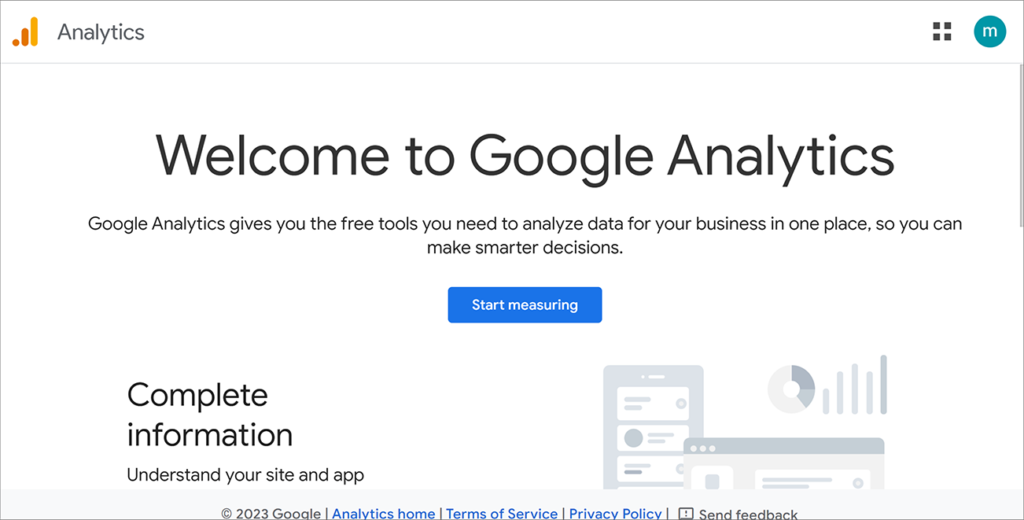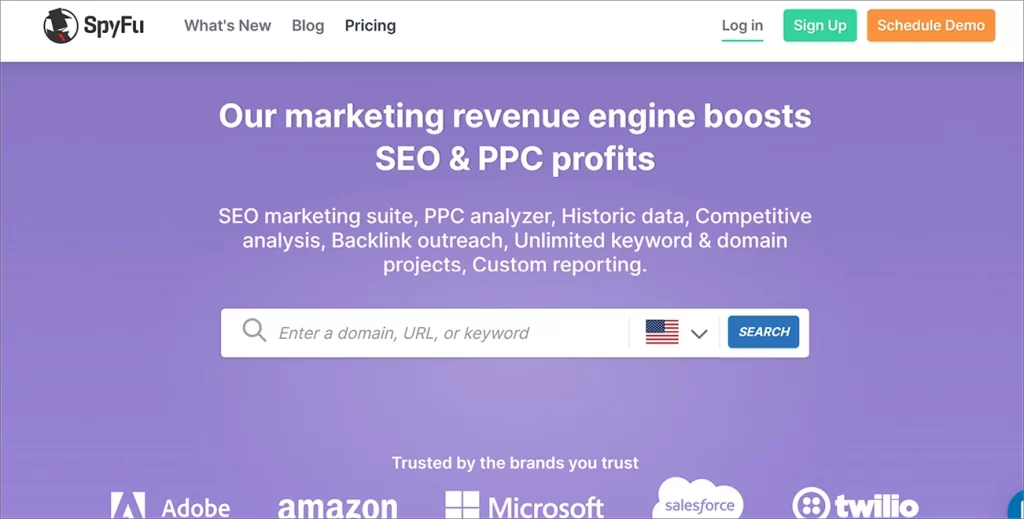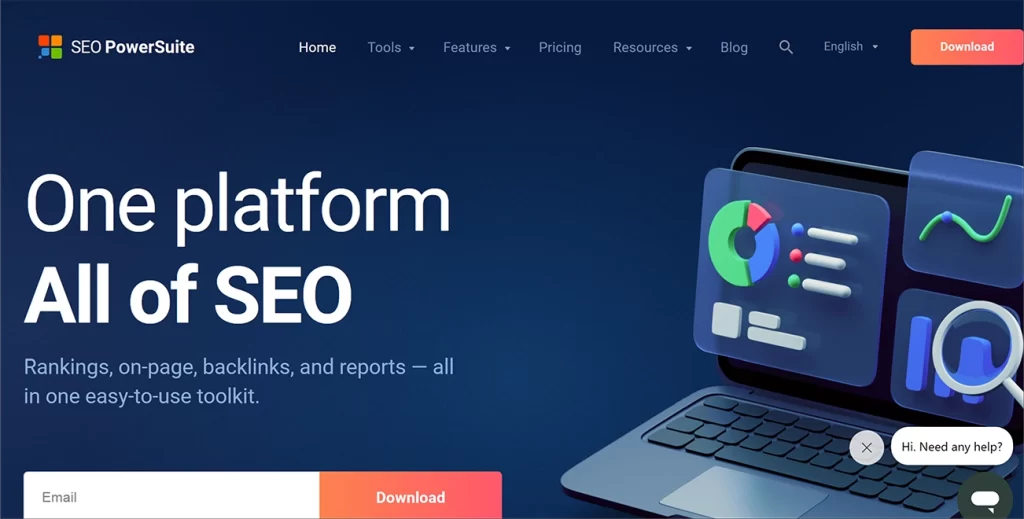15 Best SEO Tools For Beginners

SEO tools are crucial for every well-organized SEO strategy and make it successful. However, for beginners, the SEO world can be overwhelming with its numerous technicalities and complexities. Fortunately, the best online SEO tools can help beginners understand and improve their website’s SEO performance.
These tools are affordable, easy to use, and provide many features to optimize websites’ search engine rankings. From keyword research to website analysis, these tools will help you to make informed decisions for optimizing a website and improving its performance.

List Of The Best SEO Tools Every Beginner You Must Know
It can be puzzling for beginners to choose the best SEO tool to fulfill their requirements. Here are some of the best-known SEO tools for beginners:
- Google Analytics
- Ahrefs
- SEMrush
- Moz Pro
- Google Search Console
- Google Keyword Planner
- Yoast SEO
- Ubersuggest
- SERPstat
- Screaming Frog SEO Spider
- SpyFu
- Majestic
- SE Ranking
- SEO PowerSuite
- DeepCrawl
These tools can help you get started with SEO and optimize your websites.
Ahrefs is a subscription-based, popular SEO toolset that provides various features for website owners, marketers, and SEO professionals. It helps users to research and analyze their website’s backlinks, keyword rankings, and competitors. It is the best SEO audit tool.
The tool is known for its large and up-to-date database of backlinks, which enables users to analyze their backlink profile and that of their competitors.
Features:
- Site Explorer: It lets you see your website’s performance in the search engines, including your backlinks, organic keywords, and traffic.
- Keyword Explorer: It helps you find and analyze keywords for your SEO and PPC campaigns, including search volume, keyword difficulty, and CTR.
- Content Explorer: You can use it to search for and analyze popular content in your niche or industry. You can search by keyword, domain, or topic and analyze metrics such as backlinks, social shares, and traffic.
- Rank Tracker: It helps you track a website’s progress in the search engines for your target keywords and assess it with the competitors.
- Site Audit: It helps you find and fix SEO issues like duplicate content, broken links, and slow pages.
- SEO Dashboard: It provides an overview of the website’s SEO performance, including its domain rating, organic traffic, referring domains, and top pages.
To use Ahrefs, you must create an account and buy a subscription plan. You can choose from different pricing plans based on the features they provide.

SEMrush is a digital marketing tool that provides SEO, PPC, content marketing, social media, and market research solutions. It offers a range of features, including keyword research, site auditing, backlink analysis, advertising research, and more, to help businesses attract more website traffic and enhance online visibility. It is one of the best SEO tools for small businesses.
Features:
- Domain Overview: See your competitors’ SEO tactics in a detailed way.
- Traffic Analytics: Determine the primary traffic sources for your competition.
- Organic Research: Analyze the top organic results competitors to you.
- Keyword Gap: Find low-hanging fruit to boost your return on investment.
- Backlink Gap: Quickly list the options for link development that you still need to include.
- Keyword Overview: Do a comprehensive keyword analysis.
- Keyword Magic Tool: Use various match kinds to obtain millions of keyword ideas.
- Position Tracking: On desktop, mobile, and tablet devices, keep track of your local Google rankings.
- Backlink Analytics: Analyze the backlinks of both you and your rivals in-depth.
- Backlink Audit: Examine every aspect of your backlink profile.
- Link Building Tool: Get the best prospects for backlinks in your niche.
- Site Audit: Around 60 on-page and technical SEO tests will be performed on your website.
You will have to subscribe to its plans to use SEMrush. It offers a range of plans based on access to different features.

Moz Pro is a complete SEO tools suite that helps businesses manage several aspects of their campaign and improve search engine visibility. It is another of the best tools SEO beginners can use.
Features:
- Keyword Research: Helps users find profitable keywords with accurate search volume and difficulty metrics.
- Site Audit: Identifies technical SEO issues affecting search engine rankings and offers solutions to fix them.
- Rank Tracking: Monitors keyword rankings over time to observe progress and detect improvement opportunities.
- Link Building: Helps users find link-building opportunities and monitor the quality and quantity of their backlinks.
- On-page Optimizations: Provides optimization recommendations to improve website content and structure.
- Reporting: Generates customizable reports that help users track progress and share results to stakeholders.
As it’s not a free tool, you need to sign up and subscribe to any of its plans to use this for your SEO campaigns.

It is Google’s free SEO tool to examine and improve a website’s performance in search results. It incorporates various features that allow users to monitor their website’s search engine performance, identify and fix technical SEO issues, and optimize their website’s content and structure.
Features
- Index Coverage Report: It shows pages of your website that Google crawlers have indexed and which pages have errors.
- Performance Report: It shows a website’s performance in Google search results.
- URL Inspection Tool: It helps determine if Google has indexed a specific page on your website and if there are any issues.
- Sitemap Submission: It allows submitting sitemap to Google Search Console to help Google crawl your website more efficiently.
- Mobile Usability: Its Mobile Usability report identifies any mobile usability issues on a website and suggests ways to improve mobile usability and user experience.
It also offers tools and reports for structured data, security issues, and international targeting.
You must create an account and verify ownership of your website if you want to use the Google Search Console.

Google Keyword Planner helps choose the right keywords. It provides data on search volume, keyword competition, and potential traffic for specific keywords and phrases, allowing users to identify the most relevant and effective keywords for their websites.
Features:
- Keyword Research: It can find new keywords associated with your business, services & products. You can also check the competitiveness of these keywords.
- Search Volume: You can view the monthly search volume for specific keywords or keyword ideas to identify high-volume keywords relevant to your business.
- Competition: The Keyword Planner estimates how competitive each keyword is, which can help you choose the most effective keywords for your campaigns.
- Historical Data: You can view historical data for keywords, including how search volume and competition have changed. You can identify trends and predict future performance using this data.
- Ad Group Ideas: The Keyword Planner can suggest ad group ideas based on your keywords, helping you organize your campaigns more effectively.
This tool is part of the Google Ads platform, providing valuable information about the approximate cost per click CPC for specific keywords.

Yoast SEO is an SEO plugin for WordPress that helps optimize a website’s structure & content as per search engines. The plugin offers a range of features and tools to help increase a website’s visibility in SERPs and enhance SEO performance.
Features:
- Keyword Optimization You can optimize your content for specific keywords, ensuring that search engines more easily find your content.
- Readability Analysis: It analyzes your content’s readability and provides suggestions to make it easier for readers to understand and engage with.
- XML Sitemap: It also generates XML sitemaps that assist search engines in crawling your site more effectively.
- Social Media Integration: Helps optimize your content for social media platforms like Facebook and Twitter to make it more engaging and easily shareable.
- Redirect Manager: It allows you to easily manage redirects for deleted or moved pages on your website.
- Internal Linking Suggestions: It suggests internal linking opportunities within your content to help improve your website’s navigation and SEO.
- Content Analysis: This tool analyzes your content for factors like length, subheadings, and keyword usage, helping you create more effective content for your audience.
- Duplicate Content Detection: It also detects and helps you keep away from duplicate content, which can ruin all SEO efforts.
To use Yoast SEO, you first need to install and activate the plugin on the WordPress website.

Ubersuggest is an SEO tool created by Neil Patel that helps users generate keyword ideas, analyze competitors, and track search engine rankings.
Features:
- Keyword research: It allows users to discover new keywords relevant to the business or industry. It also helps with insights into keyword competition, their search volume, and evoked bids for each keyword.
- Backlink analysis: It helps users identify their competitors’ backlinks and assess the quality and relevance of these links.
- Content ideas: Users can use this SEO tool to generate ideas based on keywords and topics related to their business. The tool provides suggestions for headlines, subtopics, and related keywords.
- Traffic analysis: It offers insights into website traffic, including the number of monthly visits, top pages, and top organic and paid keywords.
- Competitor analysis: It allows users to analyze their competitors’ online presence, including their top-performing content, backlinks, and keywords.
This SEO tool is available in both a free and paid version. The free version provides basic SEO tools, while the paid version offers more advanced features such as site audit scheduling, unlimited tracked keywords, and more detailed competitor analysis.

SERPstat is a cloud-based SEO platform offering various tools to aid businesses in improving their online visibility and search engine rankings. SERPstat aims to provide users with actionable insights that can help them optimize their online presence and achieve better search engine rankings.
Features:
- Backlink Analysis: It offers a powerful tool for users to analyze their backlink profiles, identify toxic links, and find new link-building opportunities.
- Competitor Analysis: The platform allows users to analyze competitors’ websites and ascertain their weaknesses & strengths. The tool provides data on their top keywords, backlinks, traffic, and more.
- Rank Tracking: This tool lets users track their search engine rankings for certain keywords over time.
- Site Comparison: It lets us compare our website’s performance with the competitors. The tool provides data on traffic, backlinks, keywords, and more.
- Content Marketing: It offers a content marketing tool that helps users find new ideas, analyze their content’s performance, and track their content marketing campaigns.
- API: The platform offers an API that allows users to access SERPstat’s data and integrate it into their applications or websites.
SERPstat has various subscription plans as well as a free plan. However, the free one comes with limited features.

Screaming Frog SEO Spider is a tool that can help you crawl websites and analyze them for technical SEO issues. The tool is widely used for technical SEO audits as it can quickly identify issues affecting a website’s search engine ranking.
Features
- Website Crawling: The tool crawls through the website’s pages and collects data such as page titles, meta descriptions, header tags, images, links, etc.
- Analysis: It provides a detailed analysis of various SEO factors, including broken links, duplicate content, missing meta descriptions, page titles, and more.
- Custom Extraction: Users can extract data from specific parts of the website using custom extraction rules.
- Website Architecture Analysis: This tool analyzes website architecture, including the number of internal and external links, page depth, and URL structure.
- Sitemap Creation: It can generate XML sitemaps that can be submitted to search engines.
- Integration: It can integrate with Google Analytics, Search Console, and other SEO tools to provide more insights.
- Redirects: It can identify and analyze redirect chains, redirect loops, and 404 errors.
- Visualization: It visualizes website data, such as tree maps and charts.
- Custom Configuration: You can configure the crawl settings to suit their specific needs, including crawl speed, crawl depth, and more.
- Reports: It also helps with customizable reports that can be distributed in formats like CSV, Excel, and PDF.
Screaming Frog SEO Spider offers both a free and paid version. With the free version, you can only crawl for up to 500 URLs. Whereas the paid version offers unlimited crawling and additional features such as custom extraction and integration with other SEO tools.

Google Analytics is Google’s no-cost web analytics tool that helps to trace and analyze user behavior and website traffic. While it is not a dedicated SEO tool, it does provide valuable insights that can help improve a website’s SEO.
Features:
- Real-Time Data: It provides real-time data on website traffic and user behavior, allowing users to see the number of active users on their website, the pages they are viewing, and their location.
- Audience Insights: The tool provides insights into the demographics, interests, and behavior of website visitors, allowing users to understand their target audience better.
- Traffic Sources: It tracks the sources of website traffic, including search engines, social media, direct traffic, and referral traffic, providing insights into which channels are driving the most traffic.
- Behavior Flow: The behavior flow report in Google Analytics shows the path users take through the website, allowing users to understand how they interact with their website.
- Site Search: It allows users to track site search data, including the search terms that users enter, providing insights into what users are looking for on the website.
- Conversion Tracking: It allows users to track website conversions, such as form submissions, sign-ups, and purchases, providing insights into the effectiveness of their marketing campaigns.
- Integrations: Google Analytics integrates with other Google tools, such as Google Ads and Search Console, as well as third-party tools like CRM systems and marketing automation platforms.
- Mobile App Tracking: The tool allows users to track mobile app usage, providing insights into how users interact with their mobile apps.
To use this tool for SEO, you first need to set up a Google Analytics account and install the tracking code on your website.

It is an SEO tool that provides a range of features to help users with competitor analysis, keyword research, and PPC (pay-per-click) research.
Features:
- Competitor Analysis: It allows you to spy on your competitors’ online marketing strategies. You can enter a competitor’s domain and get insights into their organic search rankings, paid search campaigns, and the keywords they are targeting.
- Keyword Research: You can discover profitable keywords, search volume data, related keywords, and long-tail keyword suggestions. It also shows you the keywords your competitors rank for and bid on in their PPC campaigns.
- SEO Competition Analysis: With SpyFu, you can analyze the organic search rankings of your competitors and identify the keywords they rank for. This helps you understand their SEO strategy and find opportunities to improve your own website’s rankings.
- PPC Research: The tool offers insights into your competitors’ paid search campaigns. You can see the keywords they are bidding on, the ad copy they use, and the estimated budget they allocate to PPC advertising. This information can help you optimize your own PPC campaigns and improve your ad performance.
- SERP Analysis: Any keyword’s organic search results, paid ads, and other SERP features can be seen with this tool. This helps you understand the competition and plan your SEO and PPC strategies accordingly.
- Backlink Analysis: This tool offers a backlink analysis feature that allows you to discover the backlinks pointing to your website or your competitors’ sites. You can analyze the quality and quantity of backlinks and identify opportunities to improve your backlink profile.
- Domain and Keyword Comparison: It enables you to compare multiple domains or keywords side by side. This helps you analyze the performance of different websites or keywords and identify trends and patterns.
- Customized Reports: It allows you to generate customized reports to track your website’s SEO performance, keyword rankings, and PPC campaigns. You can export the reports in various formats for further analysis and sharing with clients or team members.
SpyFu is available to use for free as well as with monthly subscription plans. The free version only provides limited functionality.

Majestic is an SEO tool that specializes in backlink analysis and website exploration. It provides a range of features to help users analyze and understand a website’s link profile.
Features:
- Trust Flow and Citation Flow: The tool introduces these two important metrics. Trust Flow measures the trustworthiness of a website based on the quality of its backlinks, while Citation Flow represents the number of backlinks. These metrics help you assess the overall quality and authority of a website.
- Site Explorer: Majestic’s Site Explorer allows you to delve into the link profile of a specific website or webpage. You can view important metrics, such as the number of external backlinks, referring domains, and anchor text distribution. This also helps understand competitors’ link-building strategies.
- Link Context: Majestic provides insights into the context of backlinks. It classifies links into categories such as text, image, or redirect links, helping you understand the types of links pointing to a website.
- Majestic Million: It is a list of the top one million websites based on various link metrics. It allows you to explore the most popular websites and gain insights into their link profiles.
- Bulk Backlink Checker: This tool lets you analyze multiple URLs or domains simultaneously. It is useful when you want to analyze a large number of backlinks or compare the link profiles of multiple websites.
- Link Profile History: Majestic maintains historical data of a website’s backlink profile. This allows you to track the growth or decline of a website’s link profile over time and identify any significant changes.
- Campaigns and Reports: Majestic provides campaign and reporting features, allowing you to organize your backlink analysis and generate customized reports to share with clients or team members.
You can use Majestic’s free SEO Tools, backlink profile data, and Site Explorer. But for complete benefits, you can anyone buy its Lite, Pro, and Api L plans.

SE Ranking is an all-in-one SEO tool designed to help businesses and marketers optimize their websites for better search engine rankings. It offers comprehensive features to analyze, track, and improve website performance.
Features:
- Keyword Research: It provides a powerful keyword research tool that helps you find relevant keywords for your website. You can discover search volume, keyword difficulty, and competition data to identify the most valuable keywords to target.
- On-Page SEO Analysis: It offers an on-page SEO analysis feature to evaluate your web pages for optimization. It checks factors such as meta tags, headings, content quality, keyword usage, and internal linking to ensure your pages are properly optimized for search engines.
- Competitor Analysis: It also lets you analyze your competitors’ websites and SEO strategies. You can track their rankings, backlinks, and organic traffic, helping you understand their strengths and weaknesses to adjust your own SEO efforts accordingly.
- Backlink Analysis: It provides tools for evaluating your website’s backlink profile. You can monitor the number of backlinks, referring domains, anchor text, and the overall quality of your backlinks. This helps you identify and disavow toxic or spammy links.
- Rank Tracking: SE Ranking lets you track your website’s rankings on search engine result pages (SERPs). You can monitor your keyword positions over time, track progress, and identify opportunities to improve your rankings.
- Website Audit: SE Ranking’s website audit feature scans your website for technical SEO issues and provides recommendations for improvement. It checks site speed, mobile-friendliness, broken links, and HTML errors to ensure your website is optimized for users and search engines.
- Social Media Management: SE Ranking includes social media management tools to help you monitor and manage your social media presence. You can schedule posts, track engagement, and analyze social media performance, all within the same platform.
- White-Label Reports: it allows users to generate customizable, white-label reports to share with clients or team members. You can brand the reports with your own logo and design, providing professional and insightful SEO reports.
SE Ranking offers a user-friendly interface and a few free tools for a 14-day free trial. But you must subscribe to its Essential, Pro, or Business plans for more benefits.

SEO PowerSuite is a comprehensive SEO software that consists of a collection of tools designed to help businesses and SEO professionals optimize their websites and improve search engine rankings.
Features:
- Keyword Research: It provides a keyword research tool with 24 research methods and autosuggestions that helps you discover relevant keywords for your website.
- On-Page Optimization: This feature analyzes your web pages and provides recommendations to improve their SEO performance. It checks factors such as meta tags, headings, content optimization, internal linking, and more.
- Site Audits: It includes a website audit tool that scans your website for technical SEO issues. It checks for broken links, duplicate content, site speed issues, and other factors that may impact your website’s performance in search engine rankings.
- Backlink Analysis: Its backlink analysis feature evaluates the quality and quantity of backlinks pointing to your website. It helps you monitor your backlink profile, identify toxic or spammy links, and discover opportunities to build high-quality backlinks.
- Local SEO: SEO PowerSuite includes features for optimizing websites for local search. It helps you manage and optimize your business listings on various directories, monitor local search rankings, and track your online reputation.
- Data Management and Collaboration: SEO PowerSuite provides tools for managing multiple projects, organizing data, and collaborating with team members. You can store and access all your SEO data in one place and share reports and insights with clients or team members.
To use SEO PowerSuite, you can sign in for free. Additionally, you can use its Professional and Enterprise subscription plans.

DeepCrawl is an SEO tool that provides website crawling and analysis to help optimize the technical aspects of a website for better search engine visibility.
Features:
- Website crawling: DeepCrawl performs a thorough crawl of your website, examining various aspects such as internal and external links, HTML and CSS quality, JavaScript rendering, and page load speed. It provides a comprehensive overview of your website’s structure and identifies potential issues that can affect search engine visibility.
- Site architecture analysis: It helps you evaluate your website’s architecture, including URL structure, depth of pages, and internal linking. It identifies potential issues such as orphaned pages, excessive page depth, and broken internal links that can impact user experience and search engine crawling.
- On-page SEO analysis: The tool analyzes on-page SEO elements such as meta tags, headings, title tags, and duplicate content. It helps you identify missing or poorly optimized elements, provides recommendations for improvement, and ensures that your website follows SEO best practices.
- Technical SEO auditing: DeepCrawl examines various technical aspects of your website, including XML sitemaps, robots.txt files, canonicalization, and redirects. It identifies issues such as broken links, incorrect directives, and potential duplicate content problems, helping you improve technical SEO and website performance.
- Mobile optimization assessment: With the increasing importance of mobile search, DeepCrawl assesses your website’s mobile-friendliness and responsiveness. It checks for mobile usability issues, such as viewport configuration, touch elements, and font sizes, helping you optimize your site for mobile devices.
- Data visualization and reporting: This tool also helps visualize website data, making it easier to understand and interpret the analysis results. It generates comprehensive reports highlighting issues, recommendations, and progress over time, enabling you to track improvements and share insights with stakeholders.
- Website health monitoring: DeepCrawl can regularly monitor your website for changes and issues, alerting you to potential problems that may arise. This proactive monitoring helps you identify and resolve issues quickly, preventing any negative impact on your site’s SEO performance.

Conclusion:
SEO can be daunting for beginners, but with the right tools, improving website rankings and driving traffic becomes much easier. The SEO tools mentioned above are ideal for beginners, providing easy-to-use interfaces and affordable pricing plans.
With these tools, beginners can analyze their website’s SEO performance, identify issues, and take appropriate measures to improve their search engine rankings.
